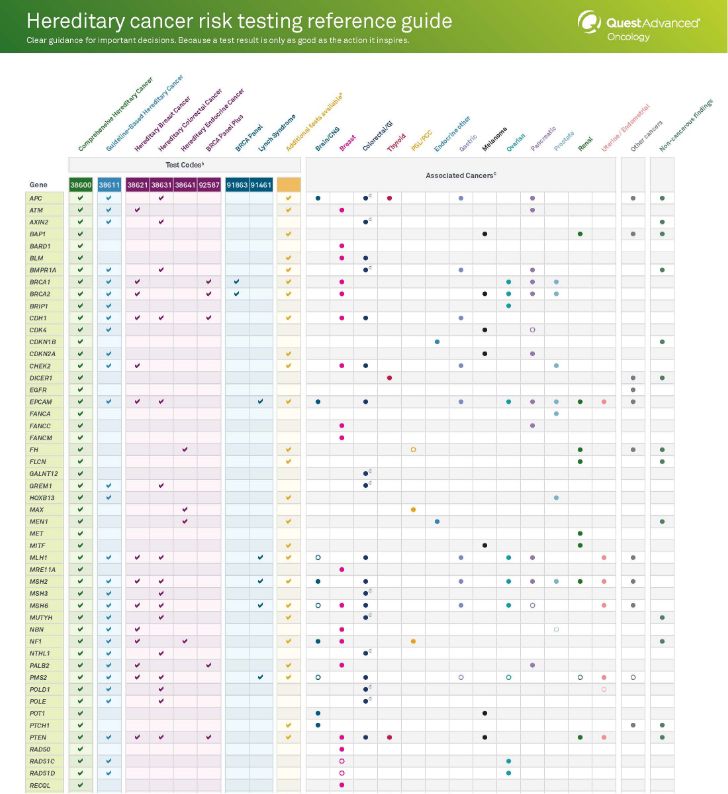The panels include genes selected by following medically accepted guidelines and can be collected using saliva, blood, or fibroblast.
Hereditary cancer genetic testing guide

The panels include genes selected by following medically accepted guidelines and can be collected using saliva, blood, or fibroblast.
Test name |
Test code |
GSP or CPT coding |
FAQ |
| Hereditary Breast Cancer Panel (18 genes) Tests for variants in 18 genes predominantly associated with cancers of the breast, prostate, and other tissues, including: ATM, BARD1, BRCA1, BRCA2, CDH1, CHEK2, EPCAM, MLH1, MSH2, MSH6, NF1, PALB2, PMS2, PTEN, RAD51C, RAD51D, STK11, TP53 |
81432, 81433 |
|
|
| Hereditary Colorectal Cancer Panel (20 genes) Tests for variants in 20 genes associated with increased risk for colorectal cancer including: APC, AXIN2, BMPR1A, CDH1, CHEK2, EPCAM, GREM1, MLH1, MSH2, MSH3, MSH6, MUTYH, NTHL1, PMS2, POLD1, POLE, PTEN, SMAD4, STK11, TP53 |
81435, 81436 |
|
|
| Hereditary Endocrine Cancer Panel (12 genes) Tests for variants in 12 genes associated with increased risk for paragangliomas, pheochromocytomas, and endocrine cancer: FH, MAX, MEN1, NF1, RET, SDHA, SDHAF2, SDHB, SDHC, SDHD, TMEM127, VHL |
81437, 81438 |
||
| BRCA Panel Plus (7 genes) Detects variants in BRCA1, BRCA2, CDH1, PALB2, PTEN, STK11, TP53 |
81162, 81307, 81321, 81323, 81351, 81404, 81405, 81406, 81479 |

Test codes may vary by location. Please contact your local laboratory for more information.
Components of panels may be ordered separately.
The CPT® codes provided are based on American Medical Association guidelines and are for informational purposes only. CPT coding is the sole responsibility of the billing party. Please direct any questions regarding coding to the payer being billed.

Only a patient’s treating physician can make diagnoses, prognostic or treatment decisions based on the knowledge of the patient, history and clinical/educational experience. Quest lab testing provides information for the physician to use in helping make such decisions.
Please talk to your Quest representative for ordering information on our comprehensive portfolio of hereditary cancer test offerings.
Hereditary cancer links